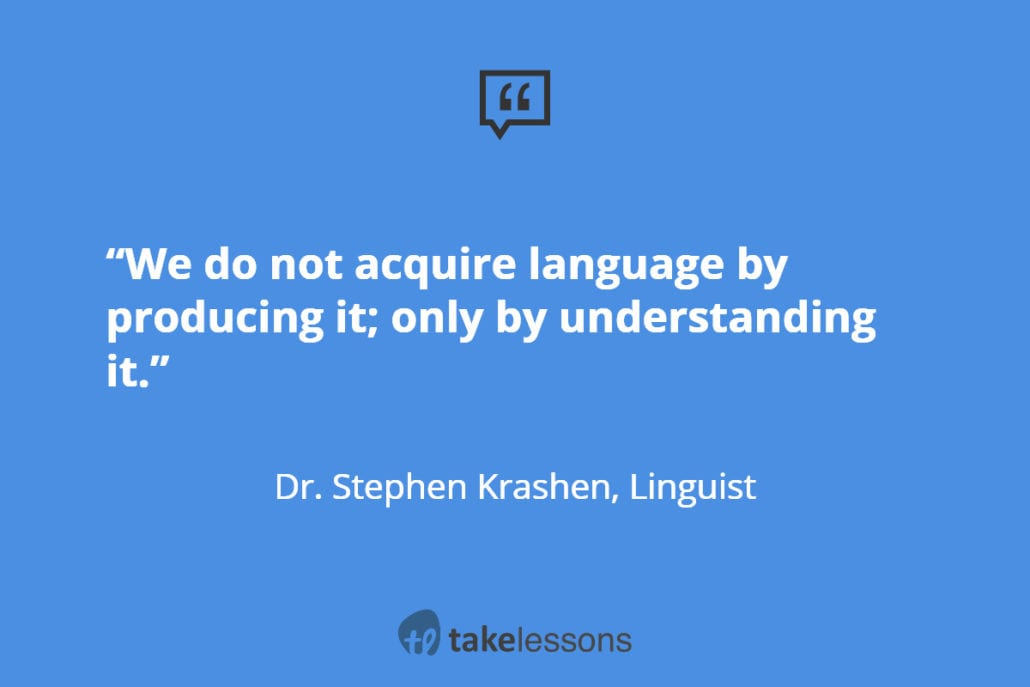Want to know how to learn German fast? Different sources say it could take anywhere from 400-1200 hours to learn the language.
A number of factors will affect the amount of time it takes you to reach fluency in German. Your native tongue, your availability to practice, and your method of learning are just a few.
Do you plan on taking German lessons with a private tutor? Are you trying to learn with simply an app to help you? Or, are you immersing yourself in the German culture? Whatever your learning style, there are a few tips and tricks that will undoubtedly speed up the process of mastering German.
Here, we’ll share 10 learning hacks that will show you how to learn German fast. Follow these tried and true shortcuts and you’ll be fluent before you know it.
How Can I Learn German Fast By Myself?
Learning a new language can be a daunting task, but it can also be an incredibly rewarding experience. If you’re interested in learning German, there are a few things you can do to speed up the process:
- Play charades
- Get real immersion
- Go on a language adventure
- Make a plan
- Use mnemonics
- Know what you need to know
Of course, the best way to learn German fast is to hire a language tutor. This will help you get used to hearing the language spoken aloud and help your pronunciation. You can also join a German-language class or group, which will give you the opportunity to practice your conversation skills with other learners.
Additionally, make use of online resources such as websites, apps, and YouTube videos that can help you learn vocabulary and grammar rules, like these:
https://www.youtube.com/watch?v=xg60VxyK-9I
How to Learn German Fast – 10 Learning Hacks
1. Play Charades
If you were dropped by parachute without any resources or local knowledge into a random city in Germany, you would quickly find that the most important skill for your survival would be the game of Charades.
You can learn any language simply by using gestures to get a native speaker to say the words you’re looking for.
Stephen Krashen, leading expert in the study of language acquisition, argues that perceiving meaning is the most important and effective way to acquire any language. When you use gestures in association with words, you are doing this in its purest form.
Next time you’re practicing your language skills with a German speaker and you don’t know the right word or phrase to say, use body language. Point to things or do descriptive motions to get them to say the words you want to learn, and you’ll find yourself naturally learning much quicker.
2. Get Real Immersion
The best way to get complete immersion in the German language is to move to a German-speaking country, but making friends who speak German near you can also create very real immersion situations.
Don’t be shy about asking people in your social circles to help you have German-only conversations. Find Facebook groups for German speakers or use sites like Meetup to participate in language exchange experiences near you.
There are also dozens of places to find a language exchange partner online, such as italki. Any of these sites would be a valuable resource for learning German quickly.
3. Find a Language Tutor
Working with a German tutor will not only help you learn faster, but it’ll ensure you’re learning German correctly. Your language tutor should be someone you feel comfortable speaking in front of. Here are some more of the key characteristics to look for in a tutor. Your German tutor should…
- Be invested and excited to help you learn.
- Encourage you to speak more in your target language.
- Be available to meet up on a regular basis.
- Hold you accountable to reaching your goals.
TakeLessons language teachers are an excellent resource for learning German fast. Teachers are available for both online and in-person German lessons.
4. Go on a Language Adventure
There are a few everyday activities that lend themselves extremely well to learning a new language. Some examples are cooking, coffee runs, grocery shopping, and watching sports. The vocabulary required to do any of these activities “in German” is fairly elementary.
Choose one of these language adventures to do with a friend and make a commitment to only speak in German. If you’re not at that level yet, keep 90% of the talking to “charades.” This will help you acquire fundamental language skills in an easy and fun way.
SEE ALSO: How Long Does it Take to Learn German?
5. Make a Plan
Having a plan, although it takes some time and mental energy to create, will greatly increase your chances of success at speeding up the process of learning German.
Ask your language tutor to help you make a plan for how you’ll master the German language. Understanding the learning process is what tutors do for a living, and the right tutor will be able to help you focus your goals into a realistic plan of attack.
Keep in mind that fluency will take 400-1200 hours of practice depending on your learning methods and how much effort you’re able to put in.
Sit down with your instructor and make a plan that you can accomplish in 6 to 12 months. Aim for a plan you’re excited about and one that you believe in!
6. Use Mnemonics
Studying mnemonics accelerates the learning process immensely. Here are a few of our favorites for learning German.
- “Est Ten Ten” helps you remember the endings when conjugating regular verbs. Ask your German instructor to explain how it works! Trust us… it’s magic.
7. Play Some More Games
To learn more vocabulary in a fun way, find a game that you like and play it with some other German speaking friends. Here are a few ideas.
- Apples to Apples. This fun game will help you learn essential nouns and adjectives. You can buy the German version known as “Äpfel zu Äpfel” or you can make your own cards for any set of words you want to study!
- 20 Questions. The word order of German questions can be a little confusing since it differs from English and there are several different types of questions. Have your language tutor explain how to phrase a certain type of question, then write 20 questions using that sentence structure for some extra practice.
- The Wikipedia Game. Play this intermediate-advanced game alone or with a friend. Go to Wikipedia and choose the German language option, then use the Random Page tool (called “Zufälliger Artikel”) twice and try to go from one article to the other only by clicking links within the articles. No translation tools allowed!
8. Know What you Need to Know
In language study, it helps when you know what you need to know in order to accomplish your goals. Your language goals will differ from other students depending on why you’re learning German.
Whether you’re learning the language for business or pleasure, try to focus on one topic at a time. Here’s one way you can prioritize the skills you’ll need to learn.
- Gesticulation – being comfortable talking with your hands
- Nouns and verbs relating to topics you care about
- Glue words – prepositions and conjunctions
- Essential grammar – tenses and word order of special phrases like questions
- Grammar details – word order, declension, special tenses, etc.
- Accent
Some would argue that accent is actually the most important since it affects how you hear the whole language. But if you’re in “emergency mode” and you need to learn functional German ASAP, start with #1 on this list and work your way to the end.
SEE ALSO: 50+ Fun Facts About Germany You Didn’t Know
9. Digitally Immerse Yourself
In the digital world, it’s easy to immerse yourself by changing the language settings on your computer’s operating system, your phone, your email account, and all your social media pages.
One key recommendation: only convert platforms that you are very familiar with and don’t have to perform important functions on a regular basis. Making the switch can really slow some processes down, so if you’re already trying to tackle a new project and you have to deal with a language barrier as well, you’ll shoot yourself in the foot.
If, however, you’re pretty familiar with a program and you want to learn all its vocab in German, switch it over and keep a dictionary app open so you can look up the words you don’t know.
10. Hit the Books
Books are the best way to learn new vocabulary and grammar. They’re inexpensive and extremely valuable for increasing your understanding of German.
Get advice from your language tutor on an appropriate book for your level. It can also be fun as an adult to pick up a German picture book for kids. It’s amazing how much you can learn from them, even after you’ve reached basic fluency.
The “Kleiner Bär” is a really good series to start with. Another great novel for students is “Monsieur Ibrahim und der Blumen des Koran.” It’s a really interesting story with a lot of good reading challenges.
How To Learn German Fast – and Free
Assuming you don’t already speak German, you’ll need to start from scratch. And while that may seem daunting, there are actually a number of ways you can learn German quickly and easily – and best of all, most of them are free!
One great way to learn German is to find a tutor. There are many online tutoring services that connect students with native German speakers. This way, you can practice your conversation skills and get feedback on your pronunciation. You can also look for online communities of German learners. These are great places to ask questions, get advice, and practice your conversational skills.
Of course, you’ll also need to put in some independent study. But there are plenty of resources available to help you with that, too. There are dozens of excellent German textbooks and learning materials available online. And if you want to practice listening and speaking at your own pace, there are also many great German language learning apps and websites that offer interactive exercises and audio content.
So don’t be discouraged – with a little effort, you can learn German quickly and easily! And best of all, you can do it for free. Check out some of the resources listed above, and you’ll be speaking German
How Long Does it Take to Learn German Fluently?
How long does it take to learn German fluently?
This is a question that has been asked by many language learners over the years. There is no simple answer, as it depends on a number of factors, including your prior knowledge of other languages, your motivation for learning German, and how much time you are willing to dedicate to studying.
However, most experts agree that it is possible to reach a proficient level of German within 6-12 months of dedicated study. This may seem like a daunting task, but remember that German is not an excessively difficult language to learn.
With consistent effort and the help of a good tutor or language course, you can be speaking German fluently in no time!
Is German Easiest To Learn?
In recent years, there has been a growing interest in learning German.
German is considered to be a relatively easy language for English speakers to learn. This is because both languages are members of the Indo-European family, which means that they have many similarities in terms of grammar and vocabulary. In addition, German has a fairly regular spelling system, which makes it easier to learn how to read and write the language.
Of course, no language is completely easy to learn, and German does have some challenges. For example, German grammar can be quite complicated, and there are many different dialects spoken throughout the country. However, overall, German is considered to be a good choice for English speakers who are looking to learn a new language.
Congratulations on making the decision to learn German fast! Learning a new language can be challenging, but it’s also rewarding and opens up new opportunities for travel and friendship.
We hope that our tips have given you some ideas about how to make the learning process easier and faster for you. Remember, everyone learns differently and at different speeds, so find what works best for you and stick with it. And most importantly, have fun with it!
Now you know how to learn German fast with these 10 shortcuts. Mastering any new language can be a challenge, but if you’re not afraid to jump into the deep end and ask for help when you need it, you’ll learn much more quickly. Consider signing up for German lessons to get the help you need.
Are there any other hacks or shortcuts that have worked well for you when learning German? Let us know in the comments below.
 Post Author: Jonathan B.
Post Author: Jonathan B.Jonathan B. teaches German, guitar, singing, piano, and more in State College, Pennsylvania. He studied music theory at Temple University and has experience working with special needs students. Learn more about Jonathan here!
Jessica Dais


